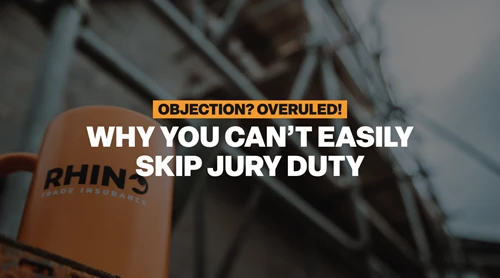One of the biggest difficulties small business owners have is managing their financial affairs.
Invoices are one of the most important aspects of a tradesperson’s financial admin. You must provide your invoices promptly when dealing with customers and suppliers because, all too often, they won't be in a rush to pay you. Still, you may not receive your money as quickly as you would like if your invoice is badly written or incomplete, regardless of how quickly you send it.
Even if you've been running your trade business for some time, you may be wondering if there's any additional information you ought to include when you draft your invoices.
This guide is here to explain the importance of invoices and what the best practices are when creating them. So, grab a brew and let's get into it.
For starters, what is a business invoice?
A recorded document known as an invoice serves as evidence of a transaction involving products or services between a buyer and seller (tradesperson and their customer). This document is a request for payment; it is neither a bill nor a receipt. Invoices often include a list of the goods/services you're billing for, the terms of payment, and other details.
Business invoicing is an essential part of bookkeeping since firms must save sales and income data for tax and accounting purposes.
What types of invoices are there?
Starting a trade business can be difficult enough without having to worry about all the different ways you can get paid. There are a variety of invoices, so it can easily get confusing.
Invoices will depend on the work you do, the industry you operate in, and how frequently you prefer to be paid determines the invoices you'll send. Here, we have listed the most popular invoices used by small businesses.
Purchase/Sales Invoice
An accounting document which records a company transaction is a sales invoice. Sales invoices serve as a record of the items purchased and the balance due from the customer. When you issue a sales invoice or receive a purchase invoice, the terms are occasionally used interchangeably.
Tax Invoice
Businesses use tax invoices to charge VAT on their products and services and to claim the VAT paid on products and services they have purchased. That is why it is occasionally referred to as a VAT invoice.
Pro Forma invoice
'As a matter of form' or 'for the sake of form' is what the Latin phrase 'Pro Forma' means. Customers receive a pro forma invoice with an estimated cost of the work before the service is performed. It may need to be changed after a project is finished to appropriately reflect the expenses, as it is not a legal record of a transaction.
Temporary invoice
Temp or Interim invoices, also known as progress invoices, charge the receiver for work that has been done on a major project up to a certain point. The amount is often dependent on the preliminary project estimate, and they are sent in regular increments.
Final Invoice
Once a project is finished, a customer is provided a final invoice for payment. It usually serves as the final interim invoice in a chain and will contain more information than interim or pro forma invoices.
Unpaid invoice
You can send an unpaid or past due invoice when an invoice isn't paid. The same information as on the final invoice should be included on past-due bills, together with an overdue stamp and any applicable interest or late payment fines.
There are various other types of invoices, such as recurring invoices and credit invoices. However, the above list are the most commonly used formats.
What should an invoice include?
As well as looking professional and presentable, your trade invoices should include the following information:
Reference number for the bill
A unique invoice reference number needs to be on every invoice you send. The simplest way to handle this is to organise information on an Excel spreadsheet using an orderly numerical and/or alphabetical system.
Your trade business's name and location
You might wish to put your phone number and email address in addition to your trading name and business address so that customers can reach you if necessary.
The name and address of the client
It is customary to include the customer's name and address on an invoice. This implies that the client may use the invoice as supporting documentation when seeking reimbursement for expenses or VAT.
A list of the items or services you obtained
Any good trade business invoice gives the customer a clear, thorough explanation of what they are paying for. To make it simple to understand, every service or item should be included on an individual line.
Date of delivery
The date the products or services were obtained or provided is known as the "supply date" and should be on every invoice you send.
Date of the bill
This is different to the above as it was not when the products or services were delivered but rather the date the invoice was written.
Costs broke down item by item.
If you are providing various goods or services like many tradespeople do, each one should be stated in an itemised list with a separate price next to it.
Sum total due
The total of all items on the invoice properly identified so that the customer understands how much they are responsible for paying.
Terms of payment
Payment conditions specify when and how a client must make payments. You might state, for instance, "Payment due within 14 days from invoice date by Bank or BACS transfer."
Payment information
Confirm the method of payment for the customer and provide any necessary payment information. For a BACS transfer, for instance, your sort code and account number will be needed.
Purchase order number
If a sale is authorised via a purchase order (PO), the PO number needs to be listed on the invoice. A PO is frequently requested by businesses because it is a binding legal instrument.
How different businesses handle invoices
When it comes to receiving payment in full and on time, a professional invoice and explicit payment terms can make a world of difference to your cash flow.
However, the kind of business you run and the type of work you conduct will affect how you create an invoice. Different legal criteria apply to limited companies, sole traders, and VAT-registered businesses:
Sole Traders must include:
- Your name
- Company trading name
- Either your home or business address
Limited companies must include:
- Name of the business
- Registered office address
- Company registration number
- Directors' names (if any)
For VAT-registered businesses, you can find out more about how invoices are managed by reading up on the subject here.
Finally, you have a few alternatives when it comes to ensuring that an invoice reaches your clients. Sending invoices is not a one-size-fits-all effort, and what works for one trade business may not be appropriate for another. You must think about the different kinds of clients you deal with and how to send them an invoice in the quickest, easiest and safest manner. The most common options will include the following:
- Posting
- Emailing
- Software
Why Choose Rhino Trade Insurance?
Handling invoices as a trade business needn't be a headache; just remembering to include the correct information and following a professional flow will ensure you get paid quicker.
For any tradespeople looking to insure their company, why not check out what Rhino Trade Insurance has to offer? Our experts have designed some great cover options that are affordable and rated five stars by over 2000 tradesmen and women in the UK.
Find out more by calling our friendly team at 0116 243 7904, or head on over to our website and use our straightforward online quote engine. You will get a price in just 60 seconds.




